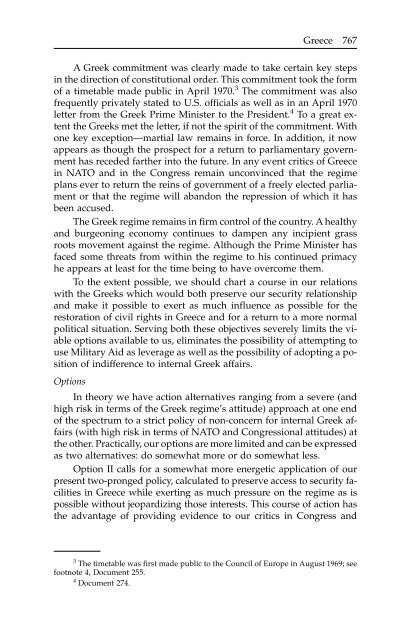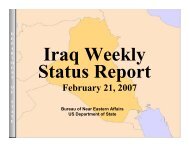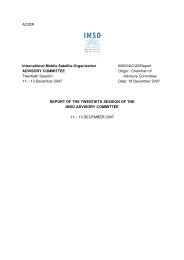Greece - US Department of State
Greece - US Department of State
Greece - US Department of State
Create successful ePaper yourself
Turn your PDF publications into a flip-book with our unique Google optimized e-Paper software.
<strong>Greece</strong> 767<br />
A Greek commitment was clearly made to take certain key steps<br />
in the direction <strong>of</strong> constitutional order. This commitment took the form<br />
<strong>of</strong> a timetable made public in April 1970. 3 The commitment was also<br />
frequently privately stated to U.S. <strong>of</strong>ficials as well as in an April 1970<br />
letter from the Greek Prime Minister to the President. 4 To a great extent<br />
the Greeks met the letter, if not the spirit <strong>of</strong> the commitment. With<br />
one key exception—martial law remains in force. In addition, it now<br />
appears as though the prospect for a return to parliamentary government<br />
has receded farther into the future. In any event critics <strong>of</strong> <strong>Greece</strong><br />
in NATO and in the Congress remain unconvinced that the regime<br />
plans ever to return the reins <strong>of</strong> government <strong>of</strong> a freely elected parliament<br />
or that the regime will abandon the repression <strong>of</strong> which it has<br />
been accused.<br />
The Greek regime remains in firm control <strong>of</strong> the country. A healthy<br />
and burgeoning economy continues to dampen any incipient grass<br />
roots movement against the regime. Although the Prime Minister has<br />
faced some threats from within the regime to his continued primacy<br />
he appears at least for the time being to have overcome them.<br />
To the extent possible, we should chart a course in our relations<br />
with the Greeks which would both preserve our security relationship<br />
and make it possible to exert as much influence as possible for the<br />
restoration <strong>of</strong> civil rights in <strong>Greece</strong> and for a return to a more normal<br />
political situation. Serving both these objectives severely limits the viable<br />
options available to us, eliminates the possibility <strong>of</strong> attempting to<br />
use Military Aid as leverage as well as the possibility <strong>of</strong> adopting a position<br />
<strong>of</strong> indifference to internal Greek affairs.<br />
Options<br />
In theory we have action alternatives ranging from a severe (and<br />
high risk in terms <strong>of</strong> the Greek regime’s attitude) approach at one end<br />
<strong>of</strong> the spectrum to a strict policy <strong>of</strong> non-concern for internal Greek affairs<br />
(with high risk in terms <strong>of</strong> NATO and Congressional attitudes) at<br />
the other. Practically, our options are more limited and can be expressed<br />
as two alternatives: do somewhat more or do somewhat less.<br />
Option II calls for a somewhat more energetic application <strong>of</strong> our<br />
present two-pronged policy, calculated to preserve access to security facilities<br />
in <strong>Greece</strong> while exerting as much pressure on the regime as is<br />
possible without jeopardizing those interests. This course <strong>of</strong> action has<br />
the advantage <strong>of</strong> providing evidence to our critics in Congress and<br />
3<br />
The timetable was first made public to the Council <strong>of</strong> Europe in August 1969; see<br />
footnote 4, Document 255.<br />
4<br />
Document 274.
















